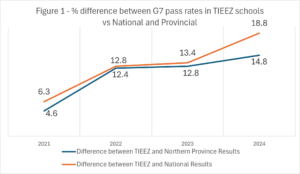TIEEZ Continues to Innovate, as Latest Results and External Evaluation Confirm Impact
When PEAS launched the Targeted Improvement for Equitable Education in Zambia (TIEEZ) programme in 2021, we set out to demonstrate that it’s possible to strengthen education systems at scale by working in partnership with government and focusing on what works.
TIEEZ is our collaborative effort with the Zambian Ministry of Education, which takes the highly effective and innovative elements of our PEAS network schools and applies them in government partner schools. Our goal? To help government schools achieve better outcomes – without increasing costs.
Thanks to the Zambian government’s exciting commitment to free secondary education for all, PEAS’ innovative approach is more relevant than ever. As enrolment increases, it is critical that quality keeps pace. TIEEZ is constantly innovating, finding the most effective elements of our education programme, like the PEAS Top 10 Teaching Practices and cycle of school improvement, and ensuring that these can be scaled in a sustainable way.
Measuring Impact: What We’re Seeing in TIEEZ Schools
The TIEEZ programme was launched in 20 pilot primary schools. Since then, the programme has demonstrated positive results, and been scaled in phases to now reach 130 government secondary and primary schools across Zambia.
The pilot schools are a great example of how the PEAS school improvement model creates sustainable impact. TIEEZ Primary schools’ World Management Survey results have increased year on year, from 2.5 at baseline (2021), to 4.5 in September 2024. The WMS is an internationally-used tool that assesses the quality of management practices in schools, such as how school leaders set goals, monitor performance, and support teaching. Further, their Learning Walk scores have increased from 2.5 at baseline to 4.1 in June 2024. Learning Walks are short, focused classroom visits used to observe a school’s teaching and learning practices, helping to track improvements in instructional quality over time.
What’s New? Promising Results from 2024 Exam Data & External Evaluation
When we introduced TIEEZ, one of our goals was to tangibly demonstrate that our school improvement model improves learning outcomes. The latest data from 2024 Grade 7 examinations suggests that we have met this ambition.
- In 2024, the TIEEZ Primary schools’ pass rate of 90% was higher than the national average (71%) and the provincial average (75%) – a percentage difference of +19% and +15% respectively.
- TIEEZ schools are improving exam results at a faster pace than provincial and national averages – the performance gap has consistently widened every year since 2021, from 6.3% in 2021 to 18.8% in 2024 (see Figure 1).

These internal results are extremely positive, and corroborating these trends with external evaluations shows a similar picture. DevTech systems recently published an evaluation (2024) on the USAID-funded CATALYZE EduFinance Activity in Zambia, of which TIEEZ was a crucial component. The evaluation confirmed several positive developments:
- The TIEEZ programme was found to have a strong foundation for sustainability with great potential for scalability (DevTech, p.26) Regarding this potential of scalability, an MOE official remarked:
“[…] the collaboration with PEAS has led to significant improvements in teaching practices and lesson planning, and there is a strong interest in expanding these benefits to other schools.” (DevTech, p.41)
- One of our key missions is improving girls education and outcomes. The programme was found to effectively address gender and inclusivity issues by fostering a safer learning environment (DevTech, p.26). One parent is quoted as saying:
“As parents, we are immensely grateful for the invaluable support provided by [the program]. We are seeing a reduction in early marriages, and the school is supportive when we report cases of violence and the safety of our children” (DevTech, p.10)
- There was a reduction in the proportion of lowest-performing learners in TIEEZ schools between 2021-2022 (Devtech, p. 33). Parents and teachers supported these findings saying:
“[Parents and teachers] believe that TIEEZ schools were able to effectively address the needs of the lowest performers through the PEAS TIEEZ emphasis on interactive and learner-centred teaching methods” (DevTech, p.13)
- Finally, the evaluation found that the programme incorporated and addressed the needs of disadvantaged groups, improving equity in learning outcomes (Devtech, p.33). The evaluation specifically highlighted the positive impact on girls:
“PEAS collaborates closely with various stakeholders, ensuring that girls, in particular, are supported in accessing education and overcoming financial barriers that may hinder their academic progress.” (DevTech, p.42)
Through PEAS’ innovative practices, our partner schools continue to improve and set the standard nationally through our TIEEZ program. We are proud that the recent data and evidence suggest that our approach to education works and is helping keep more girls in school whilst improving exam pass rates and enhancing efficiency.